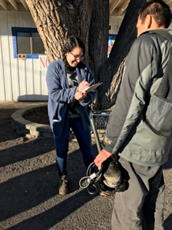The Homeless Continuum of Care Corner - Summer 2020
2020 Rural Arizona Point In Time Count
 The Arizona Department of Housing serves as the Lead Agency of the Arizona Balance of State Continuum of Care (AZBOSCOC) covering the state’s 13 rural counties. The Department is tasked by the U.S. Department of Housing and Urban Development (HUD) with conducting a Point in Time (PIT) count of persons and families experiencing homelessness in January each year. Surveying takes places in a variety of locations in Arizona’s 13 rural counties. A total of 355 volunteers participated in this year’s count. Separate counts took place in Pima and Maricopa Counties.
The Arizona Department of Housing serves as the Lead Agency of the Arizona Balance of State Continuum of Care (AZBOSCOC) covering the state’s 13 rural counties. The Department is tasked by the U.S. Department of Housing and Urban Development (HUD) with conducting a Point in Time (PIT) count of persons and families experiencing homelessness in January each year. Surveying takes places in a variety of locations in Arizona’s 13 rural counties. A total of 355 volunteers participated in this year’s count. Separate counts took place in Pima and Maricopa Counties.
The preliminary results of the 2020 Point in Time count of unsheltered individuals in Arizona’s rural counties include:
-
860 individuals were interviewed. A total of 1175 individuals (adults and children) were counted.
-
Of the persons counted, 89% were either adults who were alone or adults staying with other adults.
-
Of the individuals interviewed, 138(16%) indicated they had served in the armed forces. A total of 176 individuals (adults and children) were a part of a household that included a Veteran.
-
Of the individuals interviewed, 398 met the definition of chronically homeless. A total of 551 individuals (adults and children) were a part of these households.
The number of unsheltered individuals counted by county is as follows:
| County | Total # of individuals interviewed |
Total # of individuals in households (adults and children) This includes individual interviewed |
| Apache | 4 | 5 |
| Cochise | 58 | 72 |
| Coconino | 51 | 65 |
| Gila | 36 | 44 |
| Graham | 7 | 7 |
| Greenlee | 0 | 0 |
| La Paz | 178 | 313 |
| Mohave | 162 | 201 |
| Navajo | 32 | 37 |
| Pinal | 159 | 211 |
| Santa Cruz | 12 | 12 |
| Yavapai | 70 | 93 |
| Yuma | 91 | 115 |
| Total | 860 | 1175 |
In addition, information is collected from housing providers about persons who were sheltered. These programs are funded by HUD Continuum of Care, Emergency Solutions Grants (administered by the Arizona Department of Economic Security), AHCCCS, the U.S. Department of Veteran Affairs, the Arizona Department of Housing-Housing Trust Fund, funds dedicated for survivors of domestic violence, and local public and private funds.
A total of 1,061 homeless individuals were sheltered in these programs:
-
231 transitional housing.
-
830 emergency shelter including shelters for domestic violence survivors.
The information collected during the annual count helps estimate the numbers of homeless persons, identify their needs, and directly impacts local and federal efforts to secure funding, target existing resources and set community service priorities in ending homelessness.
Housing Matters | Summer 2020